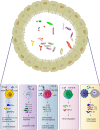Immunology of Inflammatory Bowel Disease: Molecular Mechanisms and Therapeutics
- PMID: 35310454
- PMCID: PMC8928114
- DOI: 10.2147/JIR.S353038
Immunology of Inflammatory Bowel Disease: Molecular Mechanisms and Therapeutics
Abstract
As a main digestive organ and an important immune organ, the intestine plays a vital role in resisting the invasion of potential pathogens into the body. Intestinal immune dysfunction remains important pathogenesis of inflammatory bowel disease (IBD). In this review, we explained the interactions among symbiotic flora, intestinal epithelial cells, and the immune system, clarified the operating mechanism of the intestinal immune system, and highlighted the immunological pathogenesis of IBD, with a focus on the development of immunotherapy for IBD. In addition, intestinal fibrosis is a significant complication in patients with long-term IBD, and we reviewed the immunological pathogenesis involved in the development of intestinal fibrogenesis and provided novel antifibrotic immunotherapies for IBD.
Keywords: immune system; immunological pathogenesis; immunotherapy; inflammatory bowel disease.
© 2022 Lu et al.
Conflict of interest statement
The authors declare no conflicts of interest in this work.
Figures




References
-
- Weinblatt ME, Keystone EC, Furst DE, et al. Adalimumab, a fully human anti-tumor necrosis factor alpha monoclonal antibody, for the treatment of rheumatoid arthritis in patients taking concomitant methotrexate: the ARMADA trial. Arthritis Rheum. 2003;48:35–45. - PubMed
-
- Sandborn WJ, Feagan BG, Rutgeerts P, et al. Vedolizumab as induction and maintenance therapy for Crohn’s disease. N Engl J Med. 2013;369:711–721. - PubMed
-
- Feagan BG, Sandborn WJ, Gasink C, et al. Ustekinumab as induction and maintenance therapy for Crohn’s disease. N Engl J Med. 2016;375:1946–1960. - PubMed
Publication types
LinkOut - more resources
Full Text Sources
Other Literature Sources
Research Materials

